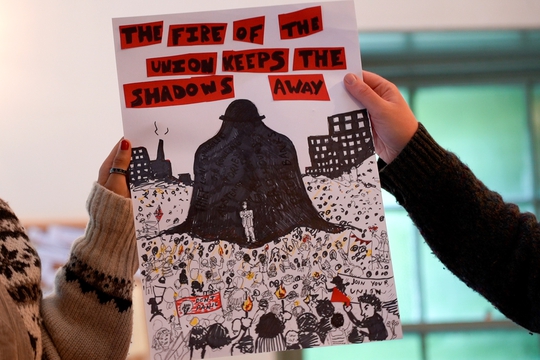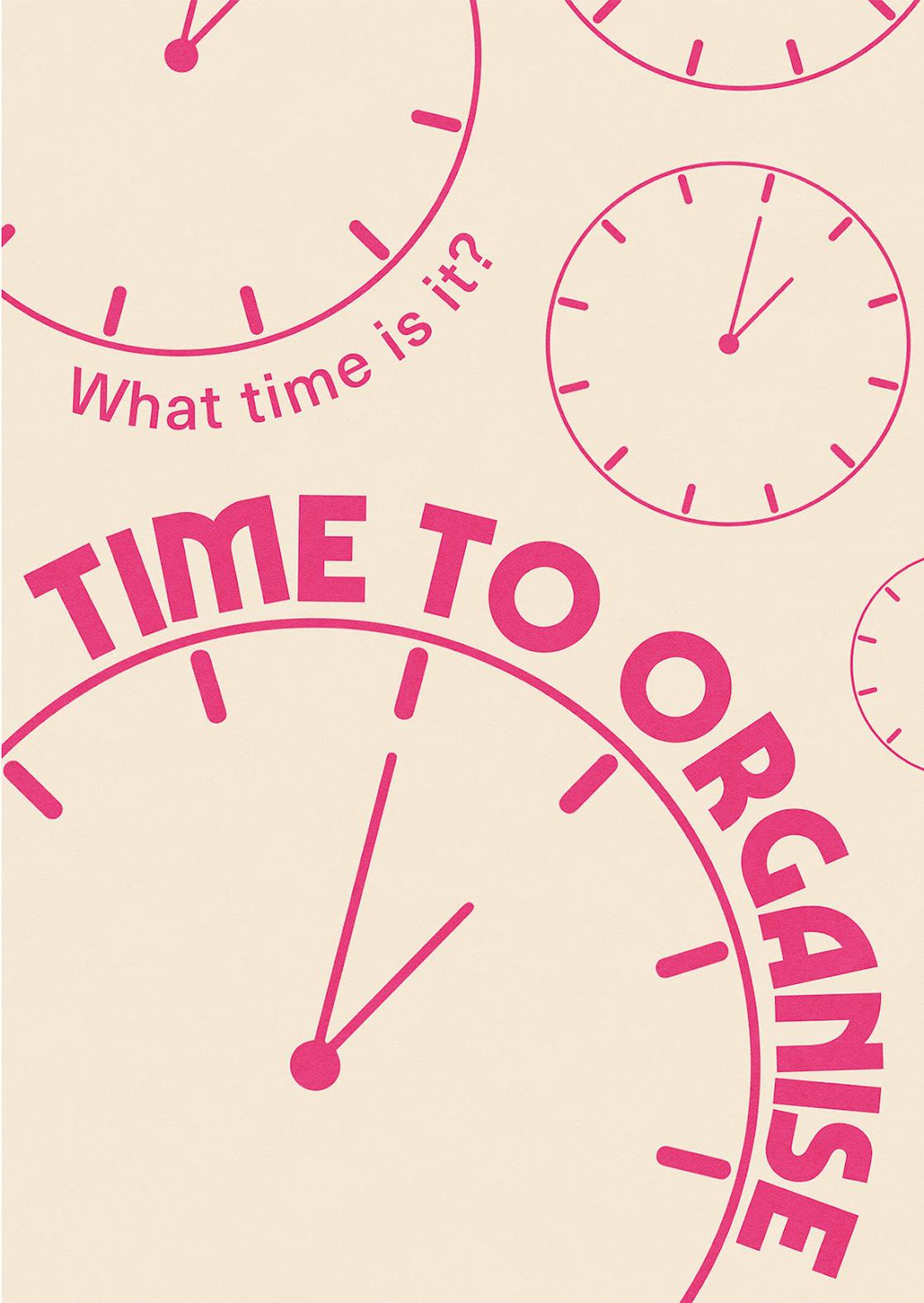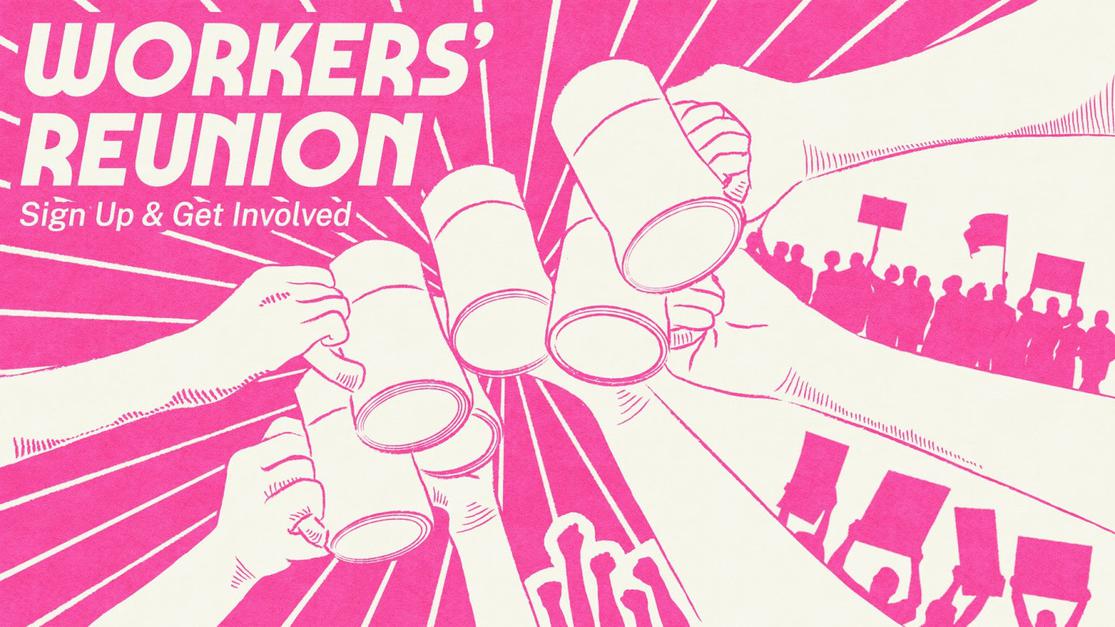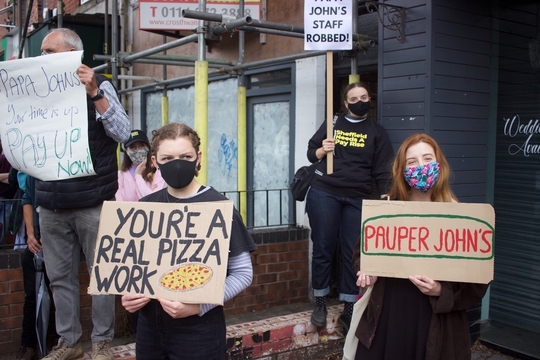Organising Culture in the Hospitality Industry
by
James Barrowman,
Cailean Gallagher
August 21, 2024
Featured in Shift Patterns (#21)
Two hospitality organisers in Scotland discuss the successes and challenges of initiatives like Better Than Zero and Unite Hospitality. The authors propose avenues for sustainable worker organising, primarily around cultural organising to raise class consciousness and solidarity in an unorganised industry.

inquiry
Organising Culture in the Hospitality Industry
Two hospitality organisers in Scotland discuss the successes and challenges of initiatives like Better Than Zero and Unite Hospitality. The authors propose avenues for sustainable worker organising, primarily around cultural organising to raise class consciousness and solidarity in an unorganised industry.
The belief is widespread that poetry is not about the expression of opinion,
not about ‘politics’, not about employment, not about what people actually
do with their time between waking up and falling asleep each day; not
about what they eat, not about how much the food costs.” - Tom Leonard, Radical Renfrew
The hotspots of hospitality organising maps are short campaigns in response to especially pernicious acts by employers, which often result in destruction of smaller businesses and brand damage to bigger ones.1 One effort to support such organising is the Better Than Zero (BtZ) initiative,2 linked to the Scottish Trades Union Congress (STUC). In its most active phase, before the Covid pandemic, it gave precarious workers a route to unionising and political and revolutionary education, at trainings, actions, and residential summer schools. BtZ fostered local groups of workers who were prepared to provide support and solidarity for others whose employers were screwing rates of exploitation up beyond the industry average. It helped workers to seed their own branches of STUC-affiliated unions - a Unite branch of Dominos workers, a BECTU branch of Cineworld staff, a Prospect branch of tech workers. Yet activists often tended to be as transient as the work itself, local groups often withered, and new branches lacked support from central union offices. BtZ is now fairly inactive online and has fallen down the STUC’s agenda.
One thing that endures is Unite Hospitality, an organising unit that emerged from BtZ with the heft of Unite the Union behind it. Driven by the formidable energy of its full-time organiser, Unite Hospitality has proved that high-intensity campaigns can successfully avenge some of the extravagant attempts by companies – often ones struggling to stay afloat – to increase the degree of exploitation even if the union does not have significant density, durability, or a culture of deep organising in the company. Recently, workers at the 13th Note pub won an employment tribunal,3 while Unite’s efforts helped a hundred sacked Virgin Hotel staff scrape back their due wages. But organising around such flashpoints does not naturally create the conditions for collectives and combinations to grow in specific workplaces.
There is however another enduring legacy of BtZ: the development of new creative cultures of hospitality organising. This article draws on years of organising in the sector as well as new conversations about work in high street hospitality chains to consider three ways to think about purposeful and durable organising in the hospitality industry, above and beyond methods like Unite Hospitality’s. It by no means seeks to downplay or deny the value of what BtZ or Unite Hospitality have done in Scotland. Instead it reflects on the post-Covid period to inquire into some of the other ways that hospitality organising might generate more value, or – since that term is so associated with the valorisation of capital – more meaning and worth for hospitality workers, by creating different kinds of cultures that contribute to changing the social and political composition of this significant and growing fraction of the working class. What if the meaningful contribution to the world that came from the hospitality industry was the result not of the profit-drive of companies, but the work of the workers in generating radical cultures despite them?
Here are three categories of gains that might come from local combinations of workers in and across hospitality workplaces, large and small, who are working for viable businesses which have not provoked resistance:
- Improving material conditions in work: acting concertedly to improve pay, terms and conditions, or the labour process in ways that result in meaningful material gains for workers.
- Creating radical culture at work: using work-time, work-resources, and work-relationships to undertake creative and culture projects that contribute to radical consciousness as workers.
- Generating worthwhile community through work: making worksites and work resources the material for building radical communities that affect the character and culture of their place.
In all three categories, value is being extracted by workers from their workplace in the service of their material, political, or social interests. This trio of options roughly tracks the three elements of class composition that are described elsewhere on Notes from Below: technical, political and social. Improving labour processes by, say, reducing targets or making temperatures and music more ambient or healthy changes the technical composition of work. Collaborating to raise class consciousness through plotting a pamphlet or cartoon strip about work, for instance, raises workers’ awareness of their situation in a power relationship and affects their political composition. And generating community or cultural initiatives in and through work – a radical book-club, a messy art group – contributes to creating recreational cultures that contribute to better lives, affecting the social composition of the local working class. Although they will not be done with the intention of benefiting the company, none of these cases will necessarily damage its interests. Indeed, they might generate more revenues or local affinity with the company. But while one measure of the power of the organised working class is to harm capital’s return, that is not the only measure of class power. Another is its capacity to compose itself differently, and yet another is to put work time to other ends than capital designs. Recreational organising and the generation of class culture are ways of creating meaning through the work that many workers find so meaningless. Recomposing the technical and social aspects of work in turn can produce strong political organisations in and across workplaces. Better conditions and schedules can make work healthier and less precarious, stabilising worker turnover and creating security. Social organising at work can generate stronger working class communities through which political ties and projects can develop within and beyond the workplace.
To start with a place: what could more creative organising cultures do in the major urban conurbations and interconnecting arteries and nodes of Scottish life known as the central belt? The term minimally means the strip of Scotland that stretches from coast to coast via Glasgow and Edinburgh, and more expansively means the whole area between the Highlands to the north and the Lowlands to the south. Colloquially it often stands for the land framed roughly by Dundee to Dunbar on the east and Greenock to Girvan in the west. However defined, most people in Scotland live and work in it, and its hospitality sector shapes the social composition of Scotland’s working class. Much leisure time and money are spent in this industry. It is the industry by which distinctive identities and cultures of different towns and regions are assimilated. The homogenisation produced by the hospitality sector creates the conditions for the uprooting of life and the transience of work and workers that serves both Scottish and foreign capital so nicely. The uniformity of the hospitality industry erodes local eccentricities, characteristics, and caprices. Workers in it are employed in an ongoing commodification of the central belt. Do they have capacity at the same time to produce a more community-controlled, communal, even communist life?
Three examples of unorthodox organising initiatives over the last few years illustrate some of the ways that organising cultures can create radical effects despite their lack of durability. They map roughly onto the three kinds of organising set out above, although each contains elements of all dimensions described.
Workers’ Reunion
In the summer of 2021, as Covid restrictions were beginning to ease and companies were reopening shops, an initiative called Workers’ Reunion took to central belt cities and towns to engage with workers in high street hospitality and retail. This initiative of the campaign group Better Than Zero focused on providing workers with a network to enable them to respond to companies’ attempts to change conditions in the wake of Covid restrictions ending. Workers’ Reunion was not concentrated on seeding union branches or BtZ local groups, but on reinvigorating a political culture among hospitality workers and inviting them to reengage with the union movement on their own issues and terms, from below. Using language of mutual care and collective self-interest, its flyers and conversation frameworks urged workers to come together to fight for small workplace gains. Groups arms with flyers and beermats visited workplaces around Edinburgh, initiating conversations and in doing so generating a collective support and a solidarity network and organising culture that begun to fill the vacuum of activity during the Covid lockdown.4 While WR focused on supporting workers to identify and address issues at work, enabling them to take control of aspects of technical composition, it affected their social composition through setting up channels of support, and their political composition by bringing people into political education programmes and other movements. Many of the workers involved attended courses like the residential Workers’ Summer School at Falkland, where young people from across a range of workplaces and campaigns produced pamphlets and posters, played games, wrote songs and slogans, and developed creative organising methods and cultivated friendships that are the fibres of political life.5 Workers involved in WR also found comrades and mentors for their work in trade unions and other organisations like the Scottish rent union, Living Rent. They also built confidence and courage to initiate campaigns in and across hospitality workplaces.


Stirling Hospitality
In 2018, a small gang of hospitality workers came together in Stirling to create a mutual support group to share information and make it easier to address their workplace issues and their reproductive needs in the city. The labour pool in Stirling is transient even by hospitality standards. Its hospitality industry depends on a fast-flowing tourist economy as a staging post to the highlands, and a large student body that attends its campus university. Some seek work to take the opportunity of living for a while on the threshold of the highlands, while others supplement student loans with bar or café work. Workers often lacked local knowledge and links, making exploitation all the easier for employers. People who arrived in Stirling and took work in the sector were invited to get involved and join events where they found companionship, information, and guidance. When workers lost jobs and needed more work, they were advised what was available, and also what issues and troubles there were in different companies. There was also a channel to Citizens Advice, and Better Than Zero which provided organising support. In many respects the Stirling Hopitality group operated like journeyman compagnonnages, the informal collectives established in eighteenth century France by itinerant precarious workers who brought their skills to unfamiliar towns and cities where they needed to quickly find out how to earn a decent living.6 While the group’s focus related to social composition, at the same time it provided workers with support to address troubles relating to schedules, training, tools, work relationships and other matters of technical composition. It also affected workers’ political composition by becoming a conduit for bringing workers towards education, like Take Control – a course on initiating a union in a small workplace that focused on developing durable power.
Amplify Dundee
While the previous material was largely written from the experience a former organiser of Better than Zero who was involved in the various initiatives, the third example describes the experience of the worker who organised it. He has worked in retail, hospitality and tourism for the last decade and has recently returned to barista work, stimulating his reflections on previous organising in a coffee shop.
In 2018 I was working full-time in the Caffè Nero on the Murraygate in Dundee. Having completed an English degree the year before, I spent a large portion of my shifts thinking about how I could find ways to explore my interest in writing and radical literary production while so many free hours were being eaten up by post-work lethargy or pre-work anticipation. I tried to get more involved in the city’s existing literary scene, but I found it frustrating. Not because it was unwelcoming, or lacking in vibrancy, but because it was difficult to engage with in and around a demanding day job. There were several cosy writing groups operating out of libraries and community centres, and the feedback you would receive there was often high quality, but constantly varying shift patterns made it impossible to reliably attend. There were also open-mics and performance-orientated groups that met in the evenings, such as the ongoing Hotchpotch Dundee or John McCann’s playwriting scratch night Scrieve - but no matter how warm and engaged the crowds at these events always were, it could still be hard to face such an environment after an exhausting day of customer service.
Around the same time my then manager was encouraging the staff to come up with ideas for activities we could run in-store, to take our existing customer base of regulars and try to foster a community through shared experiences. We tried an experimental charity Bingo afternoon, in which I acted as caller, but despite a laugh we found it too disruptive to the daily operation of the shop. I pitched the idea of a fortnightly creative writing group that would operate after hours, open to all but set within the closed shop. We would produce new work and publish our own existing work in zines and pamphlets. The idea was enthusiastically received, and I was lucky to have a boss who was open to unusual suggestions.
We called it Amplify Dundee. We charged for coffees and teas, but there was often an array of wastage pastries I could offer to the participants. Refreshingly, despite leaving a till on, it was established that the aim of the endeavour was not profit incentive, but forging a creative culture within our cafe. My colleagues and superiors, and the company at large, made no attempt to programme or censor the contents of the sessions, the way we advertised, or the work we collectively produced. Although they often weren’t aware of how we framed the exercises we were undertaking, they didn’t seek that awareness and I was left to my own devices. As a result, mine and others’ politics were able to become an explicit element of everything that we explored over the course of the following year.
Myself and several of the regulars who made the evening possible were of the left, and we explored our radical themes in the work we produced. We were able to do so while prioritising accessibility and never turning away an interested party. We had a clear political edge, sharing Tom Leonard’s words printed at the top of this essay online, promoting poetic engagement with everyday working class experience. While clearly about developing a creative and radical culture of writing in our city, our initiative also had social composition aspects in that it was creating the space for writers and workers to explore creative capacities and express their social experiences. While its impact on technical composition was harder to discern, the invitation to join a group of like-minded workers created the setting for safe and secure discussion about conditions.
One of the things that came out of Amplify was a Dundee contribution to a series of place-based anthologies called Dostoyevsky Wannabe Cities. This allowed us to share what we produced within a larger internationalist framework of writers producing radical or stylistically innovative literature - other anthologies were based not only on other UK cities like Bristol or Nottingham, but also Berlin, Amsterdam, and Santiago. We secured this publication after the group had been running for just a few months, having released only one of our planned zines. The publisher, proudly independent and a passion project of two working class creatives with their own careers in other sectors, resonated with our aim of using a hospitality workplace as a site for autonomous literary production. They were hugely supportive of the group and its editor who, on reflection, had little in the way of experience in pulling together a book-length compendium of work. Looking back, while there are things I would have done differently, and inevitable mishaps, we developed a solid mass of interesting work and managed to publish fifteen Dundonian writers on the subject of their city, many seeing their writing in print for the first time. That is an achievement, undoubtedly.
When I was interviewed about the book by Creative Dundee in 2019, I noted that local writers lacked a central base or space where they are allowed to come together, and had no resources provided by the city. When cultural spaces have developed they are often predicated on the drinking of alcohol. We sought the inclusive, late-night café culture often dreamed of, and at times we got close. We emulated the history of the café as a space from which radicalism can emerge, as penny universities and breeding grounds for revolutionary ideas. That remained solely an aspiration, even when little glimmers of potential made me feel it was indeed possible. With proper institutional backing it could be so. But allowed or not, resourced or not, we assembled in the café chain we chose, and effectively coopted its resources to our cultural ends.
Conclusion: Towards Cultural Organising
If there is something poetic in these kinds of organising, it is poetry of the kind that Tom Leonard says most people do not think of as poetry: about politics, employment, what people do with their time. It goes far beyond what is considered the normal way of organising in the hospitality industry. But if we are concerned about the creation of class culture and our contribution to composing a stronger, more self-conscious and powerful working class, these are all worthwhile organising initiatives. The normal approach to organising is to identify suffering or grievance, to focus in on it, and to set out to achieve the negation of this negative, in other words, to frame and gain a positive win which is related to the worker’s conditions, income, or prosperity. This is a noble aim and it is and always will be a mainstay of union organising. But it need not be the only one. ‘Why are you so soundly, so solemnly convinced that only the normal and the positive – in brief, convinced that prosperity alone is advantageous? I’m not campaigning for suffering, or for prosperity. I’m advocating … my own caprice and that it should be guaranteed me when the need arises.’ So wrote Fyoder Dostoyevsky, but you do not need to be a Dostoyevsky wannabe to think that a positive, pay–and-conditions, prosperity-focused type of organising can develop alongside a more capricious and creative organising style and impulse. And if Dostoyevsky focused on the I, communist organising is focused on the we, and on our common capacity, caprice, and creativity.
All these organising styles give cultural substance to the more quotidian power-building that happens when workers shape their own class composition through their own initiatives. Autonomy and creative organising are closely connected. And the results of many different experiments or elements of creative organising all advance the interest of the worker. Self and shared interest remain deep motives for autonomous action. 50% of workers in the UK hospitality and leisure industries apparently believe that their job makes no meaningful contribution to the world.7 Different kinds of creative organising, or cultural organising, can put the glimmer of revolutionary energy into everyday work and action. Capital valorises community only if it can sell commodities through it. If hospitality workers feel a missing sense of community, they can valorise it for themselves and others. Perhaps through cultural organising, work can come to have more meaning, both for workers themselves and for the better world to come.
-
Dewar, Caitlyn (21 Apr 2023) ‘Restaurant at arts centre closes following dispute with staff’, STV News ↩
-
Gallagher, Cailean, Collins, Sarah (2018) ‘Brand Damage: Better Than Zero and the Conditions of Company Fear’, Notes from Below. ↩
-
Scottish Licensed Trade News (17 Apr 2024) 13th Note workers win compensation for redundancies ↩
-
https://www.workersstories.org.uk/workers-reunion-no-return-to-normal/ ↩
-
The best book on compagnonnages is The Rites of Labor: Brotherhoods of Compagnonnage in Old and New Regime France by Cynthia Maria Truant ↩
Featured in Shift Patterns (#21)
Subscribe to Notes from Below
Subscribe now to Notes from Below, and get our print issues sent to your front door three times a year. For every subscriber, we’re also able to print a load of free copies to hand out in workplaces, neighbourhoods, prisons and picket lines. Can you subscribe now and support us in spreading Marxist ideas in the workplace?
Read next


